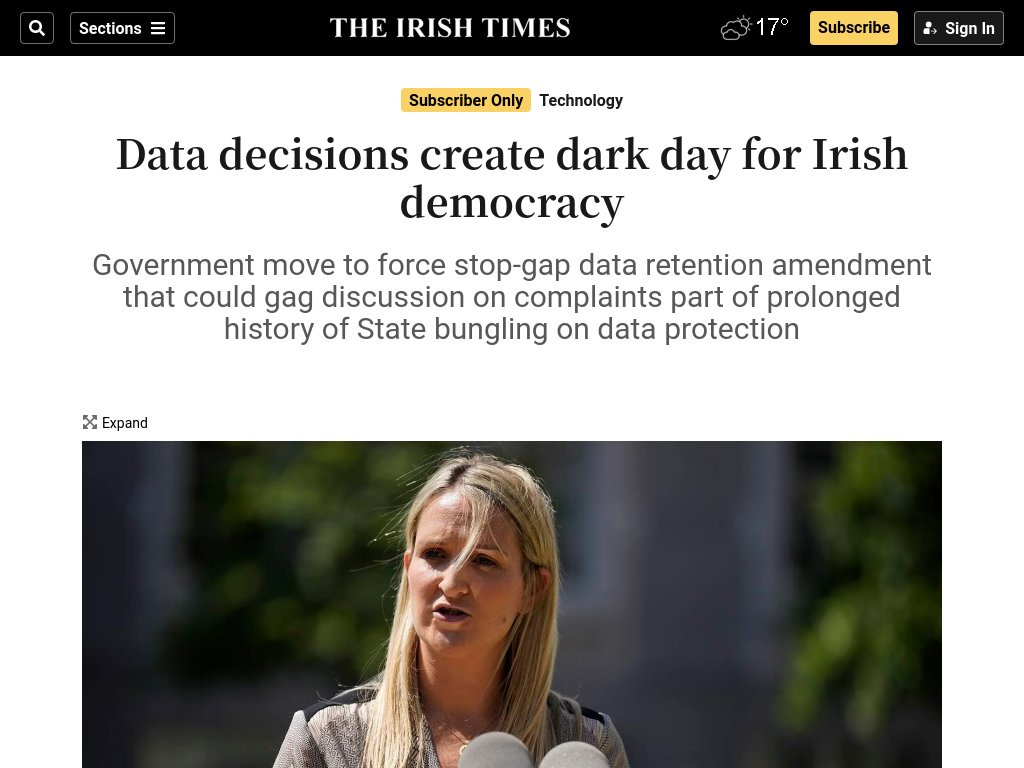Protecting Your Speech vs Protecting Mine
Our new data approach is a "Dark Day for Irish Democracy"? You don't say
“A dark day for Irish democracy” blared a prominent Irish Times headline yesterday. The accompanying picture was of Minister for Justice Helen McEntee and you might be forgiven for thinking this had something to do with the ongoing historic embarrassment of our proposed Hate Speech laws. You’d be wrong. This is what happened:
Two extraordinary, last-minute actions by the Government this week trample on democracy, will further exacerbate unresolved dilemmas mostly of the Government’s own making and are certain to create further international, reputation-damaging complications in the future.
These are, first, the secretive, closed-door hearing Monday during which Minister for Justice Helen McEntee imposed 12-month blanket communications data retention on the Irish population and, second, a stupefying proposed amendment introduced only last week to year-old draft legislation, allowing the Irish Data Protection Commission to gag public discussion of what it determines to be “confidential” elements of any complaints it is considering. The bill passed a Dáil vote last night.
The Data retention order stems ultimately from the failure of the government to implement a European ruling related to data retention laws. This failure has allowed a number of people to challenge criminal convictions that are based in part on data retained by the state as evidence. The most prominent case is that of murderer Graham Dwyer, which prompted the government to close the legislative gap in an undemocratic and secretive manner.
The other matter, the proposed amendment, seems to be targeted at stopping a particularly active campaigner talking publicly about his Data-related cases against the Irish Government. This proposal was prompted by the same gap.
All of this is deeply uninspiring and won’t come as a surprise to anyone who has witnessed the grim shambles of the Hate Speech law’s passage through the Oireachtas. On that front, over the past week Leo Varadkar stated that he couldn’t name the different identities the law is explicitly designed to protect, and against whom hate speech will shortly be illegal. Former Attorney General Michael McDowell highlighted a previously unscrutinised passage in the law that may allow members of the public to perform citizen’s arrests for hate speech.
Despite these flaws and many others, no reporter would ever tell us, as they do on the data issues, that the proposed Hate Speech law is “a continuing shame and international embarrassment” that “tramples on democracy” that will lead to “reputation-damaging consequences” for the country. So what gives?
The answer is that journalists believe the Data retention laws will likely affect their dealings with confidential sources, with the requirement to retain data possibly having a chilling effect on sources’ willingness to engage with journalists. The amendment to prevent discussion of ongoing data-related cases has obvious implications for journalists ability to investigate and report, and is reminiscent of the super-injunctions we occasionally hear about from the British press.
The underlying factor to bear in mind is that Ireland is the official HQ of many (most?) of the world’s most powerful tech companies, meaning that a disproportionate amount of oversight of their data practices is also located here. That’s a lot of very juicy stories that journalists won’t be able to talk about if government plans come to fruition.
The Data ruling and proposed amendment both seem bad, as would anything which might prevent people from thinking or talking or writing about something interesting. But it’s impossible to sympathise with the implicit press argument that these rulings will make reporters professional lives and their role in “speaking truth to power” harder. (I can barely type that out.)
There isn’t any evidence on the Hate Speech laws that speaking truth to power is a big part of the agenda. Quite the reverse, the Irish media have been the biggest cheerleader for those laws, where they’ve bothered covering them at all. Independent Newspapers even made a public submission in support of such laws during the consultation phase.
With the data decisions, as with the longstanding push to change our libel laws, it seems the only time the Irish media can be relied on to go to bat against speech restrictions is when its own material interests are at stake. If the press are ready to admit that the government’s attitude on speech is causing democracy in Ireland to darken, and the government’s behavior to be an objective embarrassment, all you can say to that is we’ve been here waiting - what took you so long?

